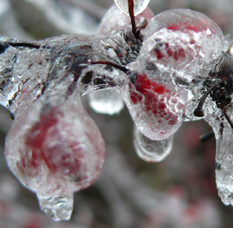Winter 2012
Table of Contents - Vol. VIII, No. 4
Poetry Translations Fiction Non-fiction Reviews
Briceida Cuevas Cob
You made your mother happy.
From the very depth of her eyes
love was hatched.
The midwife told her that you would be a girl
when she saw you perched inside
the wasp's nest of your mother's womb.
It made your mother happy.
In the bubbling of her grief
she broke her silence.
She was born again by your birth.
My daughter,
fasten a stickpin to your blouse,
put on your red panties,
drink the water in which the metate was washed.
So that mother moon will not leave its stain
on the bud from your body
when you scratch.
Night of the eclipse.
The night the dogs tattooed the silence with barking.
The night the conchs groaned.
When the people came running because the moon had been eaten.
In the darkness
a woman,
the most pregnant among the pregnant;
she that never sticks pins,
that never wore red panties
nor drank water in which the metate had been washed;
she that scratched her eyes so that her baby´s eyes would come out blacker,
she gobbled the moon,
and while everyone had turned their gazes to the moon in the sky,
the woman illuminated the village with the light that spilled from her womb.
© Jonathan Harrington
Tu madre
Tu madre se puso contenta.
Desde lo más profundo de sus ojos
brotó su amor.
La comadrona le dijo que serías hembra
cuando te vio colgante del vientre panal
de avispa de tu madre.
Tu madre se alegró.
En el borbolleo de su añoranza
revoloteó su silencio.
Ella renacería con tu nacimiento.
Hija mía
préndete los alfileres en la ropa,
ponte la pantaleta roja,
bebe del agua con que se lavó el metate
para que mamá luna no deje su mancha
en el cuerpo de tu retoño
cuando te rasques.
Noche de eclipse.
Noche en que los perros tatuaron con sus ladridos el silencio.
Noche de gemidos de caracoles.
Cuando la gente corría porque se habían comido a mamá luna.
En la oscuridad
una mujer,
la más embarazada entre las embarazadas;
aquella que no se prendió alfileres,
aquella que no se puso la pantaleta roja
ni bebió del agua con que se lavó el metate;
aquella que se rascó las pupilas para que su retoño las tuviera más negras,
engulló a la luna,
y mientras todos buscaban a la luna con la mirada en el cielo,
la mujer alumbraba al pueblo con la luz que desparramaba su vientre.
A na
A na’e’ ki’imakchaj u yóol.
Ichil u jach taamil u yich
p’óoch u yaamaj.
x-Aalansaj tu ya’alaj ti’ leti’ ko’olel ken u síis
le ka tu paktaj ch’uyukbalech tu pak’xuuxil u
chun u nak’ a na’.
A na’e’ ki’imakchaj u yóol.
Ti’ u jach popok’look u ts’íibol
pepekxik’naj u ch’e’eneknakil.
Leti’e’ bin jel ka’a síijik kun síijikech.
In xch’upul aal,
ch’ik púuts’o’ob ti’ a nook’,
tak a xchak eex,
uk’ u xp’o’oja’il ka’
yo’olal ma’ u p’atik u yuuy xma uj
tu wíinklil a chaampal
ken a la’achabaj.
U áak’abil tu chibil uj.
U áak’abil ka laj p’u’uj peek’o’ob u tak’ u jajawchi’ibalo’ob ti’ ch’e’eneknakil.
U áak’abil tu yáakan ju’ob.
Le tu máan yáalkab máako’ob tumen ts’o’ok u jaanta’al xma uj.
Ichil ek’joch’e’enil
juntúul ko’olel,
u jach xyo’omil ichil u láak’ xyo’omo’ob;
leti’e’ ma’ tu ch’ikaj puts’o’ob tu nook’,
leti’e’ ma’ tu takaj u xchak eex
mix tu yuk’aj u xp’o’o ja’il ka’;
leti’e’ tu la’achaj u wolisil u neek’ u yich yo’olal u seen booxtal u neek’
u yich u paal,
tu luk’aj xma uj,
le tuun tu kaxanij uj tumen máako’ob ku páakato’ob ti’ ka’an,
ko’olel tu sáaskunaj ich kaaj yéetel sáasil ku k’itik u chuun u nak’.
